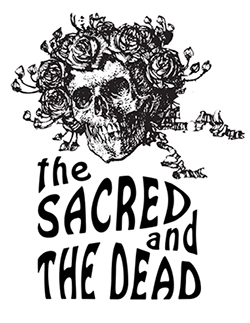Ripple in still water,
When there is no pebble tossed,
Nor wind to blow.
Reach out your hand if your cup be empty,
If your cup is full may it be again,
Let it be known there is a fountain,
That was not made by the hands of men.
~ “Ripple”
A stack of amplifiers three stories tall loomed over the 7,000 faithful arrayed on sun-baked dirt one hot autumn day in the early 1980s at Stanford University’s Frost Amphitheater. From the veritable wall of sound thundered the roars, riffs, crescendos, and diminuendos of The Grateful Dead’s songs and their long exploratory interstices—sound propagating invisibly through the adobe soil, entering the bones of our feet, crawling up our legs, our spines, and into our chest cavities.
We, too, became instruments of the music while Jerry Garcia’s nine fingers ouija-boarded across the frets of his guitar in search of a lost chord.
His fingers leading by following, Jerry peered over his reflective sunglasses at bandmates Mickey Hart, Bob Weir, and Phil Lesh. They squinted back at him and at each other, and in turn sought the crowd’s unspoken input as the music followed a tune played by a harp unstrung to a destination sensed intensely yet unknown….
Caminante, son tus huellas
el camino, y nada más;
caminante, no hay camino,
se hace camino al andar.Traveler, the only road
Is your footsteps, and nothing more;
Traveler, there is no road,
We make the road by walking.~ Antonio Machado
The Dead sang, plucked, and pounded inexorably onward toward a palpably approaching ecstasy with no knowable when, where, or how— exploring the innumerable kabbalistic nuances of a tune played countless times, then freshly interpreting the midrashic connotations of the nuances.
Everyone stood: heads bent, hair on end. On and on and…. then, convergence!

A special series on religion and culture produced in collaboration with the Office of Religious Life at the University of Southern California
A microsecond before Jerry hit the riff, we the audience leapt into the air, thrown to the sky by a fountain not made by the hands of men. We spun around to look in the wides of each other’s eyes, mouths agape with awe, hair tossed wild, overwhelmed by the unmistakable, ineffable reality of Something Larger—an emergent property not reducible to the band, the crowd, or anything mortal.
“Ripple,” penned by the band’s chief lyricist and official fifth member, Robert Hunter, is the Grateful Dead’s Psalm 23—its spiritual manifesto, its Doctrine and Covenants, its Lotus Sutra, its Bhagavad Gita.
“Ripple” is the band’s confession that its music transcends itself, that the pilgrimage of a Deadhead leads to a concert destination beyond his or her ken, that Deadheadliness is next to a mysterious kind of Godliness.
“Ripple” is the catechism of indeterminacy.
If you look at the pebble, you can’t perceive the ripple. If you sense the ripple, you’ve transcended the pebble. The music isn’t the band, the band isn’t the music.
Something subtle is at work in the realm of the Dead: a second or third or fourth derivative of ordinary reality.
Buena es el agua y la sed;
buena es la sombra y el sol;
la miel de flor de romero,
la miel de campo sin flor.Good is water and thirst;
good is shade and sunlight;
the honey of rosemary flowers,
the honey of a land without flowers.~ Antonio Machado
The ripple of a pond unperturbed.
The fullness of a cup unfilled.
The lost chord plucked on a stringless harp.
The guidance of a road without signs,
A road made by walking.
“Ripple”’s message of uncertainty is borne by a lulling tune that might well be hummed by a mother rocking her child in a hammock on a sweet summer’s day. It warmly embraces the mystery with joy and hope.
We may not get home, if there is such a place. Who can lead us there, in any case? But the song draws us in and on. We hold it near as if it were our own, and that’s just how the Dead wanted it.
They could have retired to the studio in Marin County 40 years ago and they’d still be remembered as an awesome band today. But “Ripple” sings their souls. They never saw the music as a mere commodity for them to own and control.
Let the same mind be in you that was* in Christ Jesus,
who, though he was in the form of God,
did not regard equality with God
as something to be exploited,
but emptied himself,
taking the form of a slave,
being born in human likeness.~ St. Paul’s Letter to the Philippians 2: 5-11, NRSV
Over and over and over again,The Dead have emptied themselves, endlessly going down the road feeling bad on some days and good on others, predictable in some gigs and prone to jaw-dropping serendipities in others, taking the music of the people, by the people, and for the people to the people.
They were slaves to tunes with words that glowed with the gold of sunshine, slaves to crowds of the faithful who basked in it with them.
We heard their voices come through the music, and they ripple yet in the still water in the valley of the shadow of our souls.




